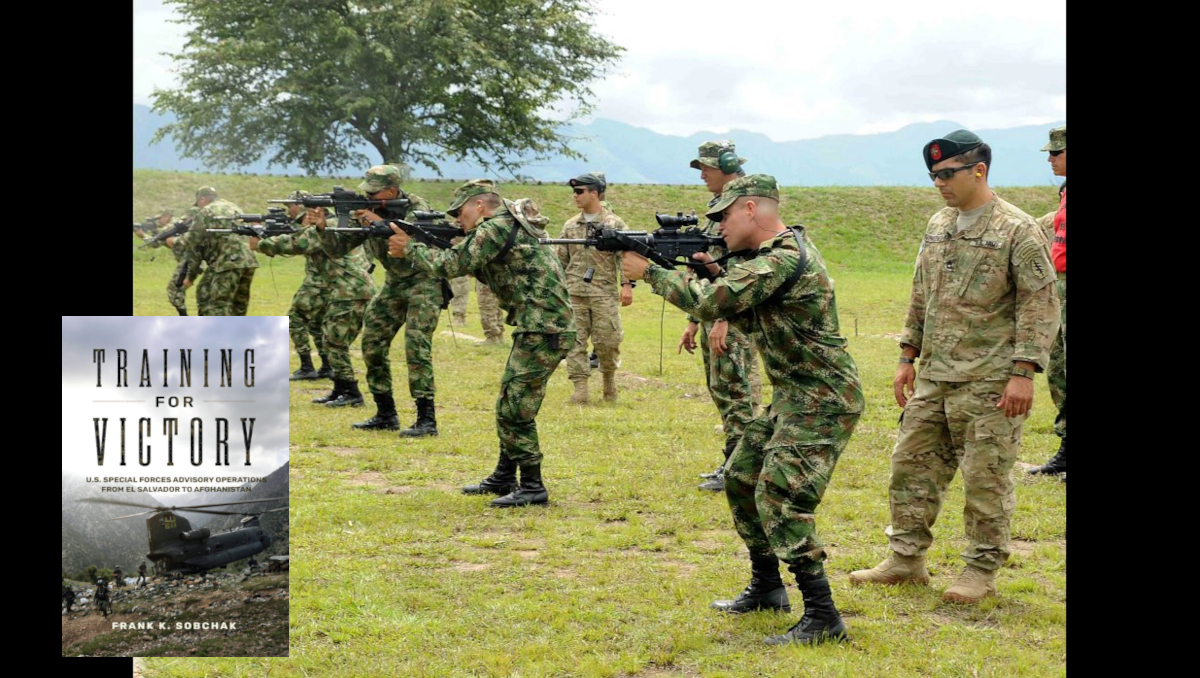
Frank Sobchak, a retired Special Forces colonel and author of Training for Victory: Special Forces Advisory Missions from El Salvador to Afghanistan, joins podcast editor Ron Granieri to discuss the complexities of security force assistance (SFA). Their conversation delves into the challenges of measuring success in advisory missions and avoiding deeper U.S. combat commitments. Frank’s research, based on five case studies (El Salvador, the Philippines, Colombia, Iraq, and Afghanistan), identifies key variables influencing SFA success. He cites advisor language and cultural awareness, advisor-to-host nation ratio, consistency in advisor pairing, combat advising, and the ability to organize host nation units. He emphasized that while not all factors need to be perfectly aligned, a majority must be in place for a mission to succeed.
Ultimately, the host nation forces have to be able to fight against their enemy and win, and they have to be able to do that on their own.
Podcast: Download
Frank Sobchak is the Chair of Irregular Warfare Studies at the Modern War Institute at West Point. He is a retired Special Forces Colonel and holds a PhD in International Relations from the Fletcher School of Law and Diplomacy. He is co editor of the two-volume set, The U.S. Army in the Iraq War Volume 1 & Volume 2, and his latest book, Training for Victory: Special Forces Advisory Missions from El Salvador to Afghanistan, was selected for the War on the Rocks 2024 holiday reading list.
Ron Granieri is Professor of History and the Chair of the Department of National Security and Strategy at the U.S. Army War College and the Editor of A BETTER PEACE.
The views expressed in this presentation are those of the speakers and do not necessarily reflect those of the U.S. Army War College, U.S. Army, or Department of Defense.
Photo Description: Green Berets from the 7th Special Forces Group (Airborne) watch as Commandos from Colombia practice marksmanship skills with the M4 Carbine in Tolemaida, Colombia, May 17, 2012. 7th Special Forces Group (Airborne) have been a valuable asset in the training of these Commandos.
Photo Credit: U.S. Army photo by Spc. Fernando Lozano Courtesy of 1st Special Forces Command – Airborne Facebook page





In some or all of the case studies, noted by Dr. (COL, ret.) Sobchak in his new book above, does Dr. Sobchak note, and suggest how SFA operated; this, to confront, and to adequately deal with, the general and overall problem presented when “modernizers” (communist and/or democratic-capitalist “modernizers”) sought to transform both their own and/or other countries? Therein, running into individuals and groups, who would lose dangerous amounts of power, influence, control, status, privilege, prestige, safety and security, etc.; this, via these exact such “modernizing” processes?
In this regard, consider the following observation by former U.S. State Department official Mathew Hoh, noted in the provided section of this 2009 resignation letter below:
“If the history of Afghanistan is one great stage play, the United States is no more than a supporting actor, among several previously, in a tragedy that not only pits tribes, valleys, clans, villages and families against one another, but, from at least the end of King Zahir Shah’s (Afghanistan’s first “modernizer?”) reign has violently and savagely pitted the urban, secular, educated and modern of Afghanistan against the rural, religious, illiterate and traditional. It is this latter group that composes and supports the Pashtun insurgency. The Pashtun insurgency, which is composed of multiple, seemingly infinite, local groups, is fed by what is perceived by the Pashtun people as a continued and sustained assault, going back centuries, on Pashtun land, culture, traditions and religion by internal and external (“modernizing?”) enemies. The US and NATO presence and operations in Pashtun valleys and villages, as well as Afghan army and police units that are led and composed of non-Pashtun soldiers and police, provide an occupation force against which the insurgency is justified. In both RC East and South, I have observed that the bulk of the insurgency fights not for the white banner of the Taliban, but rather against the presence of foreign soldiers and taxes imposed by an unrepresentative government in Kabul.” (The items in parenthesis above are mine.)
Given the fact that, today, even the most powerful nations in the world (exs: the United States, China, Russia, India, etc.) seem to be embracing “resistance to modernization”/”reversal of modernization” ideas and processes, how then will SFA be effected; this, by this such amazing transition/reversal?
The terms “cultural awareness” and “strategic empathy” are found in our current podcast (listen beginning at about the 17:00 point), as they are often found today, and often emphasized today, in many other places. Based on my initial comment above, should we now consider the idea of “cultural awareness” — and/or “strategic empathy” — today, more from the perspective offered below?
a. From the quoted item found in my initial comment above:
“If the history of Afghanistan is one great stage play, the United States is no more than a supporting actor, among several previously, in a tragedy that not only pits tribes, valleys, clans, villages and families against one another, but, from at least the end of King Zahir Shah’s (Afghanistan’s first “modernizer?”) reign has violently and savagely pitted the urban, secular, educated and modern of Afghanistan against the rural, religious, illiterate and traditional.”
b. From Harvard’s Kennedy School of Government paper “Trump, Brexit, and the Rise of Populism: Economic Have-Nots and Cultural Backlash:”
“Overall we conclude that cultural values, combined with several social and demographic factors, provide the most consistent and parsimonious explanation for voting support for populist parties; their contemporary popularity in Europe is largely due to ideological appeals to traditional values which are concentrated among the older generation, men, the religious, ethnic majorities and the less educated sectors of society.”
c. From the “Foreign Policy” paper entitled “What it Means to Be ‘Liberal’ or ‘Conservative’ in China:”
” … Until the past few years, the dominant socioeconomic or political positions in the Chinese intellectual world were clearly liberal ones: most intellectuals argued for greater institutional restraints on state activity, free market reforms, and stronger protection of civil and political rights. Even today, Pan and Xu’s paper finds that highly educated individuals are generally more liberal than less educated ones.”
Question – Based on the Above:
a. What, then, might “successful SFA missions” look like today; this, given the “cultural awareness” and “strategic empathy” matters presented above? And:
b. How, then, should we effectively train and employ security force assistance forces today; this, given the (common?) “cultural awareness” and “strategic empathy” factors noted above?